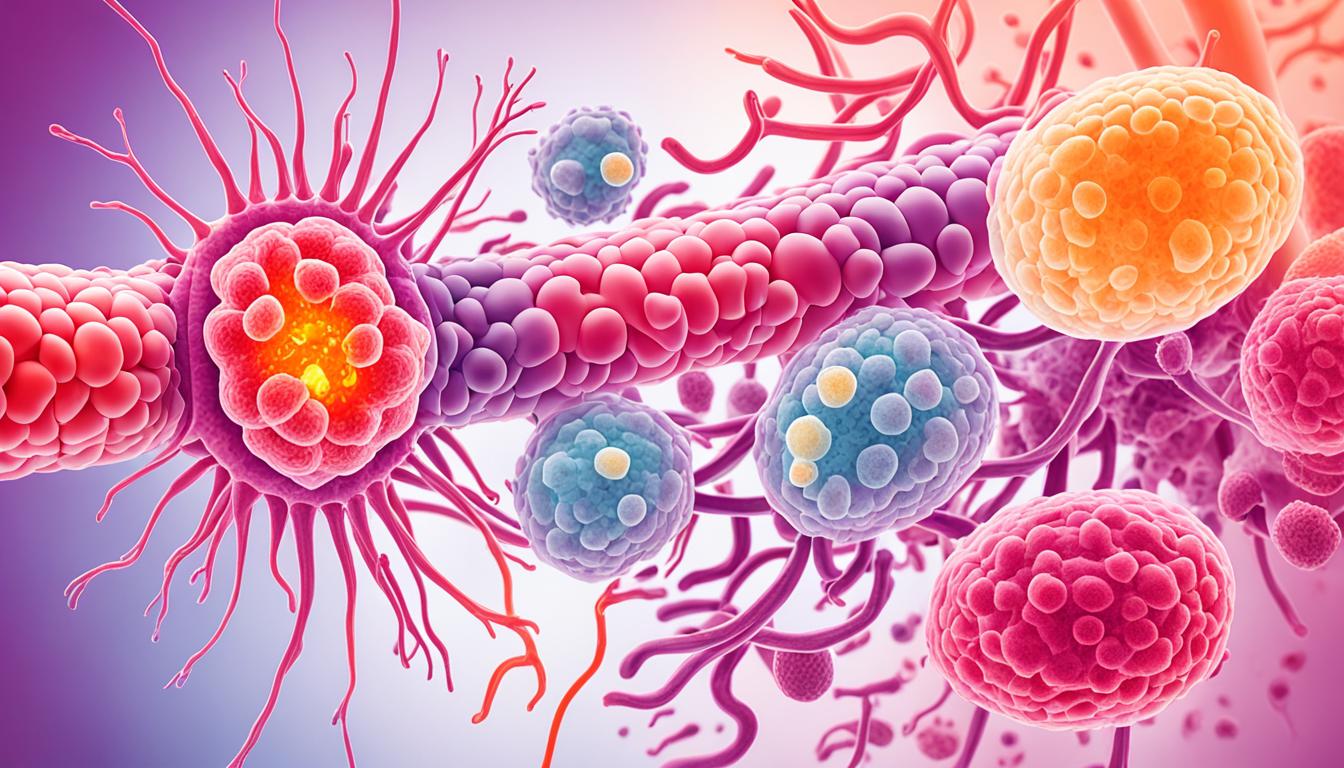Familial adenomatous polyposis (FAP) is a rare genetic disorder. It leads to over 100 adenomatous colon polyps. These polyps, masses of normal cells in the colon, can cause colorectal cancer without treatment.
Those with FAP have a higher cancer risk in organs like the stomach and pancreas. They may also show signs like bony growths, extra teeth, or eyes changes. There are different kinds of FAP, including Gardner and Turcot syndromes.
Changes in the APC gene cause FAP. It often runs in families. A genetic test is used to diagnose FAP. Guidelines for screening help manage the disease and lower cancer risk. Stem cell therapy is being looked at as a possible treatment.
Key Takeaways:
- Familial adenomatous polyposis (FAP) is a rare genetic disorder characterized by the development of more than 100 colon polyps.
- Untreated polyps can lead to colorectal cancer and increase the risk of cancer in other organs.
- FAP is caused by genetic alterations in the APC gene and can be passed down through families.
- Genetic testing can confirm a diagnosis of FAP, and screening guidelines are available to manage the disease and prevent cancer.
- Stem cell therapy is being explored as a potential treatment for FAP.
Subtypes of Familial Adenomatous Polyposis and Risk Factors
Familial Adenomatous Polyposis (FAP) has different forms, each with its risks. Knowing these types helps in finding the right treatment. The main FAP forms are:
Classic FAP
Classic FAP has over 100 colorectal polyps. These greatly raise the risk of colorectal cancer. A mutation in the APC gene causes it. Early screening is key for spotting and stopping cancer.
Attenuated FAP
Attenuated FAP has 20 to 100 polyps and shows up later than classic FAP. It also comes from an APC gene mutation. Watching it carefully is important.
Gardner Syndrome
Gardner syndrome leads to both colorectal and other tumors. It’s because of a mutation in the APC gene. Regular checks are needed to handle the tumors.
Turcot Syndrome
Turcot syndrome shows multiple polyps in the gut and a risk of brain tumors. The APC gene is to blame. It’s vital to keep watching for and treating these.
Remember, not all polyp cases mean FAP. Some come from a gene called MUTYH and lead to MAP. Also, look out for HNPCC, Peutz-Jeghers, and juvenile polyposis.
Diagnosing and Treating Familial Adenomatous Polyposis
Familial adenomatous polyposis (FAP) is found through medical checkups. Doctors look for over 100 colorectal polyps or a family background with the condition. To be sure, genetic tests are done to spot APC gene changes linked to FAP. These tests help doctors make a correct diagnosis and plan the right treatment.
The main way to treat FAP is with a surgery that takes out the colon. This surgery, called colectomy, helps control the polyps and lowers the risk of getting colorectal cancer. If there are polyps in the duodenum that are causing issues or have bad cells, they might be removed surgically too.
Some people with FAP might also get desmoid tumors, which need different treatments. Doctors might use surgery, drugs, chemotherapy, and radiation for these. Watching closely for any signs of cancer or pre-cancer is critical. This way, early steps can be taken to stop the disease from getting worse.
There’s ongoing research on how to stop FAP or its cancer risks. One idea is chemoprevention, which uses drugs to lower cancer risks in high-risk people. This may help avoid some cancers linked to FAP. Also, stem cell treatments are being explored as a potential way to manage FAP in the future. These areas of study might lead to new and better treatments.

